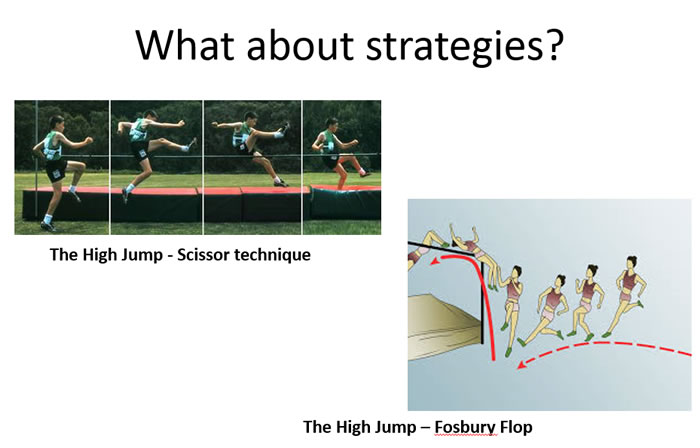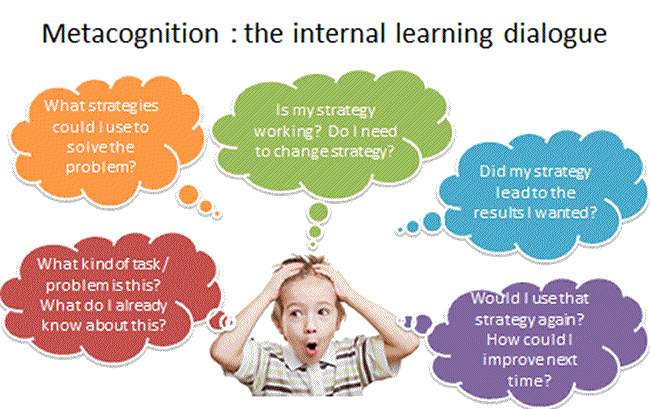Developing metacognition in your school
Evaluating strategies
Opportunities to test out and evaluate learning strategies
EXPLICITLY TEACH THE STRATGEY - PUPILS USE THE STRATEGY - EVALUATE THE STRATEGY
 Pupils need to build a tool box of strategies they can select from. E.g. how many different ways can you think of to draw a circle? How would you decide which method to use?
Pupils need to build a tool box of strategies they can select from. E.g. how many different ways can you think of to draw a circle? How would you decide which method to use?
The first step is that you need to be aware there are different strategies. The next is becoming proficient at using the strategies. Third comes the ability to select the right strategy for the task.

First you need to be aware that there are different ways to approaching the high jump. If you are not aware of a strategy 'such as the Western Role which is missing from the above example' then you can't use it. Second, once aware of the strategy you need to practice it and keep developing / refining your technique until you are really good at it and it works for you. Third, you need to be able to select the right strategy for the job. The Fosbury Flop might not always be a wise more when jumping over an obstacle!

When was the last time you explicitly taught a pupil a learning strategy? E.g. a method of note taking or a revision technique or steps for solving a mathematical problem. Did you consider alternative approaches with them? Did you evaluate how effective it was as a strategy after the task had been completed? Why did you teach this strategy at this particular time? How did it relate to your subject? How proficient would the pupil be if asked to use this strategy again?
E.g. There are multiple strategies that could be deployed to help pupils achieve a study skill such as note taking. There are lots of different ways to ‘make notes’ and lots of ways ‘note taking’ could be evaluated. What does ‘good’ note taking look like and why? Pupils need to be aware of the different forms of note taking and strategies they could use when someone asks them to make notes. They need to be skilled in a variety of forms so that they can independently select and use strategies for any challenge they face. When was the last time you asked pupils to make notes and did you help them to improve their skills of note taking at the time? Did you ask pupils to evaluate their note taking strategy at the end? Did you ask pupils to compare their note taking strategy with a partner? Did you ask them to think about why note taking skills are important?
It is important that these skills are not taught in isolation but embedded into the curriculum so that pupils can see their immediate use and the benefits of particular strategies.
Consider a homework that requires pupils to learn some key words and definitions. Spending time before the homework begins on different ways in which pupils could learn the key words and definitions is vital. Asking pupils – what strategy would you use? Have you used this strategy before? Was the strategy successful? How does it compare to the strategy I have just suggested? How long do you think you will need? When will you learn these words? How many times will you look at them during the week? Then, after the homework, the pupils consider how effective their strategy was. Did they spend long enough? Would they make changes to the strategy? How could they have made their learning more effective? How does their strategy compare to the strategy of others? Was it a new strategy they were trying? Although it may seem a lot of additional lesson time, in reality it often takes just a few minutes– building up these skills will make pupils more effective at the learning process and ultimately accelerate the rate of learning! If we want more progress and higher attainment we can’t just keep doing ‘more of the same’ we have to help learners be more effective and efficient. We need to help them see that they can improve their attainment in a variety of ways by considering the skills of good learners.
Too often we take pupil skills for granted. There are groups of pupils in your class that would benefit from additional support before / during / after a lesson specifically looking at the learning strategy. It is often our most disadvantaged pupils that use the most ineffective or inefficient learning strategies and it is these pupils that often don’t believe they can change their ability in a subject. They don’t see that ‘learning’ is something you can ‘learn’.
Examples of aspects of learning pupils need more strategies for:
- How to learn a set of key words and definitions
- How to summarise a page of text
- How to pick out the key words in a question
- How to use inference and deduction
- How to take notes
- How to answer a question fully
- How to listen to a lecture
- How to learn from complex text
- How to categorise objects
- How to prioritise
- How to write an explanation
- How to skim or scan text
- How to approach problem solving
- How to converse in a way that helps you to learn
- How to work effectively as a team
Which ones would you add from a subject specific viewpoint?
It can help to consider the learning strategies in strands:
One strand addresses how students acquire information. It includes strategies for learning how to paraphrase critical information, picture information to promote recall, ask questions and make predictions about text information, and identify unknown words in text, etc.
A second strand helps students study information once they have acquire it. It includes strategies for developing mnemonics and other devices to aid memorisation of facts as well as strategies for learning new vocabulary. These strategies help prepare students for tests, etc.
A third strand helps students express themselves. It includes strategies to help students write sentences and paragraphs, monitor their work for errors, share their ideas, contribute to group work, and confidently approach and take tests, etc.
How can you help pupils to develop an understanding of learning strategies, get them to see this as a skill they can develop and become more independent at selecting and applying learning strategies to any task set?
How can you help pupils to develop learning skills: e.g. modelling, scaffolding, examples, displays, prompts, demonstrations, think-alouds?
Links
![]()
Like to share?
Why not send us your resources.